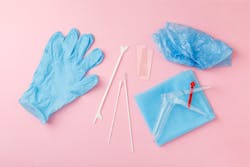Self-collected tests performed similarly to provider-collected tests for detecting common sexually transmitted infections (STIs), according to research presented at the 2023 AACC Annual Scientific Meeting & Clinical Lab Expo. These findings could enable discreet new testing options that expand access to screening.
Researchers from LetsGetChecked Laboratories and the Permanente Medical Group compared the performance of HPV tests using 144 pairs of self-collected vaginal swabs and provider-collected swabs taken from the lining of the cervix. In addition, the scientists exposed a small number of self-collected samples to temperatures that simulate extreme seasonal fluctuations. For 15 study participants, the researchers evaluated 5 self-collected swabs to assess variability in swabs taken from the same individual. This can occur due to differences in the amount of virus in each swab. Finally, the team tested approaches to optimize the collection process, such as adjusting how long samples remained dry and providing study participants with an instructional video.
Most self-collected samples showed the same results as provider-collected samples. Discrepancies were due to smaller amounts of detectable virus in self-collected samples. The samples exposed to temperature extremes had less detectable virus than those that weren’t. Changing the time a sample remained dry didn’t influence detection. The validity of samples improved by 8.5% after people watched an instructional video.
In another study, researchers from the Los Angeles County Department of Public Health and LetsGetChecked Laboratories compared provider-collected and self-collected tests for Chlamydia trachomatis and Neisseria gonorrhoeae. Patients with these common infections often don’t show symptoms, making the STIs difficult to spot.
The Centers for Disease Control and Prevention suggests that self-collected samples taken from urine or swabs of the vagina, rectum, or throat are viable alternatives to samples collected by providers. Currently, however, only urine and vaginal swabs can be self-collected within clinics. The researchers were motivated to increase inclusivity and access to STI testing by exploring additional options for self-collection and home testing.
The team compared results from 164 pairs of provider-collected and home-collected rectal swabs, and 159 pairs of throat swabs. They also performed experiments on urine and vaginal swabs to assess the impact of temperature fluctuations, hand contaminants, and underfilling or overfilling of self-collected urine samples.
Compared to provider-collected samples, self-collected rectal swabs showed a positive agreement of 95.5% for C. trachomatis and 100% for N. gonorrhoeae, while self-collected throat swabs agreed with provider-collected swabs for both infections almost 100% of the time. Furthermore, there were several swabs for both pathogens that tested positive through self-collection but negative when collected by the provider. Hand contaminants had minimal effect on the tests’ performance. Results were also largely unaffected by temperature changes and improper filling of urine samples.

